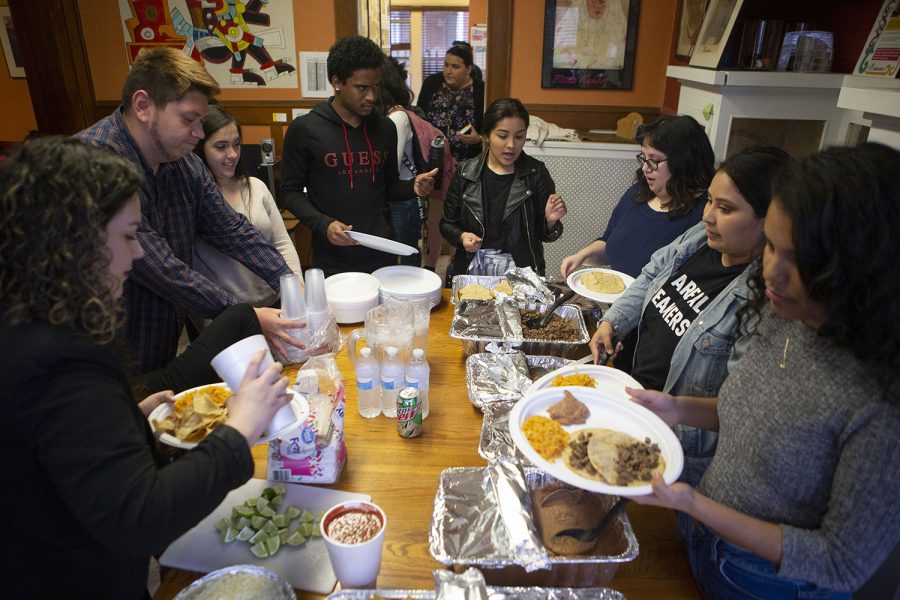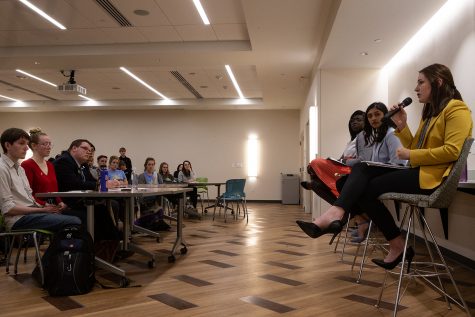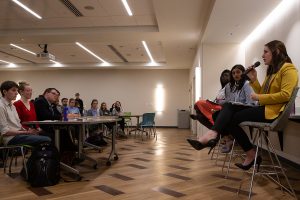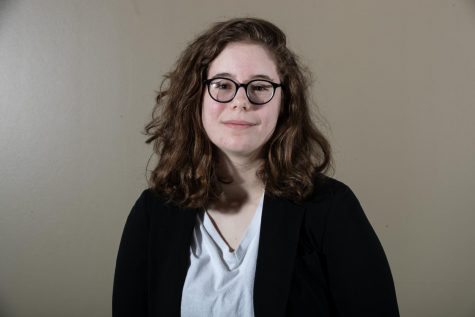The Latinx community gathers to celebrate activism
March 23 through April 3 is Latinx in Action Celebration Week at UI. Members of the Latinx community are celebrating Latinx activism and culture.
The ALMA executive board serves food during the Latinas in the Community Dinner in the LNACC on Wednesday, March 27, 2019. The event was hosted by the Association of Latinos Moving Ahead. (ALMA)
March 29, 2019
Latinx in Action Celebration Week at the University of Iowa is being held March 23 through April 3. Members of the Latinx community members are commemorating the work of Latinx activists while engaging in activism themselves.
The Latino Native American Cultural Center is hosting events in partnership with the campus and community organizations Association of Latinos Moving Ahead and League of United Latin American Citizens.
The week was initially César Chávez Awareness Week, said Thomas Arce, the cultural center coordinator.
“It has evolved into not just acknowledging César Chávez but acknowledging activists and activism across larger Latinx communities,” Arce said.
Acknowledgment of activism cannot solely focus on Latinx male voices, he said.
“We have events about Dolores Huerta, who was very pivotal around the César Chávez time period and around the labor and civil-rights movements,” Arce said.
Association of Latinos Moving Ahead President Isabela Flores said the celebration was not a response to recent movements on campus regarding minorities but is a way to continue cultural conversations.
RELATED: Latino Festival welcomes all to experience the celebration of culture
“As we began planning the events, we saw how [the celebration and movements] could correlate,” she said.
The celebration is aimed at educating the community about Latinx activism and sharing experiences.
“This is a week for us to express feelings and to communicate our struggle, our culture, our history, and how beautiful it is,” said Christopher Vazquez, a cultural center student staffer and organizer.
UI sophomore Dulce Escorcia, who has participated in past events, praised the visibility and exposure the events provide.
“It’s a reminder that this is happening, we are still here,” Escorcia said.
On Sunday evening, the cultural center hosted a discussion with UI historian Rachel Garza Carreón about past activism at university. The discussion continued Monday evening at Danforth Chapel.
“LATS Talk About Our Pride: Exploring Queer Latinidad,” an event on Tuesday evening, focused on the intersectionality of the queer and Latinx identities.
“I’m used to sorting out my identities,” Escorcia said. “Having a conversation about queer Latinidad allowed me to bring my whole self in.”
The cultural center and Association of Latinos Moving Ahead hosted a dinner Wednesday evening to recognize UI Latinas who make a difference in the community.
“A meal can nourish us not only in terms of nutrition, but also the conversation can nourish us in terms of soul,” Arce said.
RELATED: Julian Castro’s run for president banks on Latinos, but it’s a steep climb to the White House
There will be a Latinx Alumni Panel at 4:30 p.m. today in Pappajohn Business Building.
A fundraiser for United Latin Americans will take place at 7 p.m. March 31 at the Mill, 120 E. Burlington St. Democratic presidential-nomination candidate Julián Castro will speak at the event.
FilmScene will host, at 6 p.m. April 1, a free screening of Dolores, a documentary about Huerta. A discussion with members of the Latina/o Studies Program will follow.
The celebration will close at 7 p.m. Wednesday in the IMU with featured speaker Cristobal Salinas, which will focus on the power of Latinx voices.
Escorcia said the events are important for the whole community. They are beneficial to anyone who attends, regardless of ethnicity, Escorcia said.
“I had a teacher that used the example of ramps,” Escorcia said. “Just because they are assigned for people in wheelchairs doesn’t mean that they are not useful to anybody else.”





















